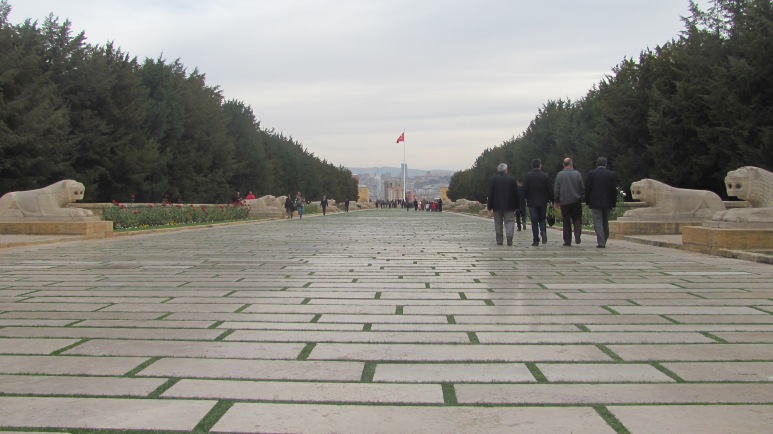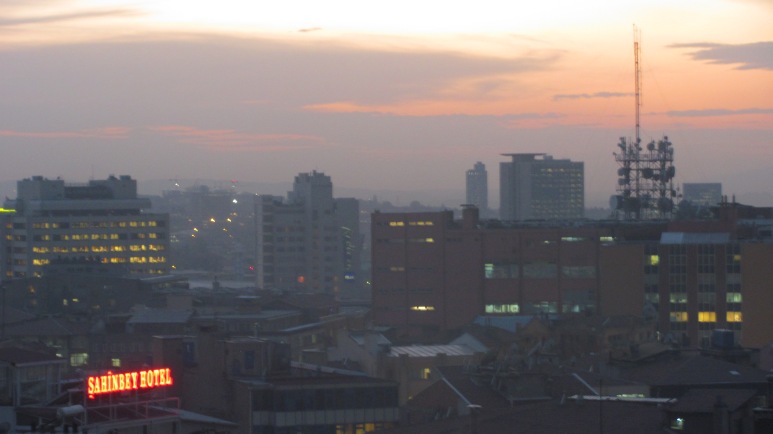The Capital City of Turkey
I clearly remember the moment three years ago when I pinned my giant map of Europe onto the wall, all excited to do some travel planning, and I realised to my shame that I had been getting the capital city of Turkey wrong. Like many, (I imagine) I assumed that as Istanbul is the city we hear most about, it had to be the capital. Well, it’s not, and no, Constantinople isn’t either. Despite being the only city to straddle two continents, Istanbul lost it’s capital status decades ago. As Canberra is to Australia, Ottawa is to Canada, Brasilia is to Brazil and Bern is to Switzerland, Ankara is to Turkey.
I flew into the real life red dot on the map from Baku mainly because it was a convenient transport hub to Cappadocia. I wasn’t expecting great things – even Lonely Planet dismisses it as ‘dusty’ but as always I was prepared to give it a go. I only had an afternoon to sightsee, so I had to make some tough decisions as to where to go. I hopped onto the metro and up to Anıtkabir, the mausoleum dedicated to Mustafa Kemal Atatürk, arguably one of the most influential figures of modern Turkish history.
Born in 1881 in modern-day Thessaloniki, Atatürk had a distinguished military career then became the first president of the Republic of Turkey. After graduating from the Ottoman Military College in Constantinople, Mustafa Kemal took part in many of the wars that sprang up as the Ottoman Empire crumbled. He is perhaps best known for his actions in the Battle of Gallipoli where he served as a front line commander. The campaign ended in victory for the Ottoman forces, and became part of the national Turkish myth as well as adding to the reputation of Mustafa Kemal. When World War I ended and the Allies occupied Constantinople and Smyrna, Mustafa Kemal became the leader of the Turkish National Movement. In September 1922, the occupying armies were expelled, and in November the wartime government formed in Ankara became the legitimate parliament and voted to abolish the Sultanate, consigning the Ottomans to the dustbin of history after 623 years of rule. The Treaty of Lausanne of 24 July 1923 led to the international recognition of The Republic of Turkey as the successor state of the Ottoman Empire.
Atatürk instituted many legal, social and cultural reforms to turn Turkey into a modern, secular state. He believed that Turkey needed to look to western European societies to modernise. Islamic law, for example, was only to be used in matters relating to religion, rather than all facets of law. Other notable reforms included the equality of women, who gained full universal suffrage in 1934, earlier than many western countries , introducing a new Latin alphabet to improve literacy, the Hat Law of 1925 which promoted western styles of dress and banned fezes and turbans for men, and made the wearing of hats mandatory for civil servants. Another reform of note was the introduction of surnames in 1934. In fact, ‘Atatürk’ means ‘father of the Turks’ as a mark of respect for Mustafa Kemal’s contribution to the modern Turkish state. In fact, when compared to his contemporaries, the totalitarian regime in the Soviet Union and the rise of Fascism, for example, his national vision and scope of reform is even more remarkable. One would just love to know what he would make of developments in Turkey in more modern times.
Anıtkabir, completed in 1953 (15 years after Atatürk’s death in 1938) is a grand and fitting memorial to a great statesman. I found it very moving and learnt a lot from my visit.
I also popped up to the old citadel in the fading light, getting hopelessly lost in the streets up the hill. I loved the view of the houses.
My hostel was full of over friendly blokes waiting for visas for Europe, so I escaped for dinner with a girl that I first met in Georgia and ended up following around Turkey. We wandered around for a bit, and ended up in a random baked potato place that didn’t have a menu in English. Ankara isn’t a tourist hotspot, but it’s an interesting place to visit on your way around the country.














